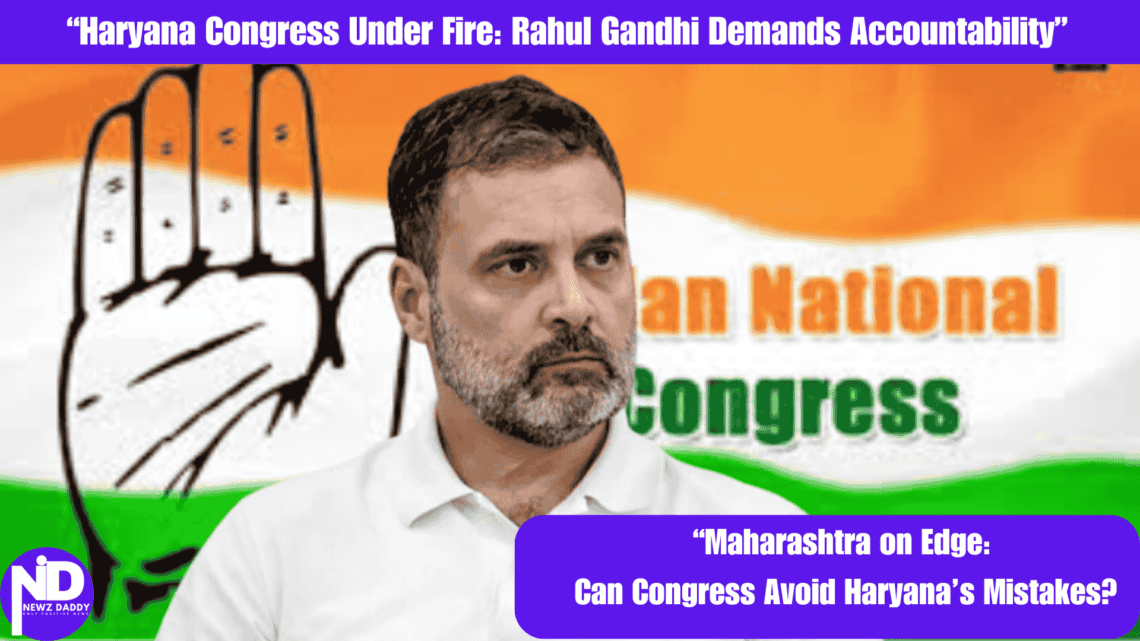“Haryana Congress Under Fire: Rahul Gandhi Demands Accountability”
Newz Daddy Political Updates
Article Synopsis
- Rahul Gandhi pointed out that the Haryana Congress leaders’ internal conflicts led to the party’s loss.
- He attended a review meeting at Mallikarjun Kharge’s residence with other Congress leaders and observers.
- Gandhi criticized the Electronic Voting Machines (EVM) and the Election Commission (EC), seeking a detailed report on election issues.
- He was particularly displeased with local leaders prioritizing personal ambitions over party success.
- A committee is being set up to investigate the loss.
- Infighting has been a recurring issue in Congress, as seen in states like Madhya Pradesh, Chhattisgarh, and Rajasthan.
- Gandhi’s efforts to resolve differences among Haryana leaders were only temporary, as they struggled to collaborate effectively.
- Similar infighting issues are arising in Maharashtra, where Congress is in coalition with NCP and Uddhav Thackeray’s Sena, emphasizing the need for unity.
- Gandhi hopes his strong stance in Haryana will prompt leaders to focus on the party’s greater goals.
Strong Words on Haryana Congress Loss from Rahul Gandhi
Rahul Gandhi tackled a crucial concern afflicting the Haryana Congress in a brief but focused meeting. Convinced to assess the party’s recent loss in Haryana, the meeting took place at Congress President Mallikarjun Kharge’s house. Among the party’s notable leaders and observers present were Ajay Maken, Ashok Gehlot, Deepak Babaria, and KC Venugopal.
Gandhi clearly expressed frustration in the conference. He remained quiet at first, but when it came time for him to speak, he made two noteworthy arguments. His first worries were around Electronic Voting Machines (EVMs) and the Election Commission (EC), which he thought had problems deserving of close inspection. He asked for a thorough study so Congress could know where counting errors might have happened. His strong posture on this issue revealed his will to guarantee the voting process fairness.
Internal Infighting: The Root Cause of the Loss
Gandhi’s second argument, though, resonated in the hall. He sharply attacked the local officials, charging them of putting personal aspirations ahead of the party’s overall performance. Sources say Gandhi was clearly offended when most leaders seemed more focused on talking about the EVMs than on fixing their own failings. He underlined that if the leaders had cooperated instead of bickering among themselves, this election might have turned out for Congress.
Clearly disapproving, he added, “fought among themselves and didn’t think of the party.” Gandhi then cut off his speech suddenly, leaving the audience silent and displaying his dismay at the leaders’ incapacity to put aside their differences.
Targeted Not Just The Hoodas But All.
Though Gandhi’s criticism was aimed at Haryana’s officials, it was not limited to one person or group. Many feel his comments were at all members, including his side and notable personalities like Bhupinder Singh Hooda. According to sources, Gandhi’s remarks were meant to be a call for unity rather than to highlight one group. Aiming to prevent similar internal strife from influencing the next elections, the party has now agreed to create a committee to look into the causes of the defeat.
Infighting Has Paid Congress Before
This was hardly the first time internal strife affected Congress’s electoral prospects. Other states such as Madhya Pradesh, Chhattisgarh, and Rajas Nadu have also seen infighting. Similar challenges have been experienced in several states, where internal strife undermined the party’s standing and produced a dismal ballot turnout.
Understanding these difficulties, Gandhi had before tried to arbitrate disputes in Haryana in an effort to present a united front. Working to bridge divisions between Kumari Selja and the Hoodas, two important members of the Haryana Congress, he But his achievements were fleeting since the leaders’ differences exposed and weakened their group power.
Maharashtra is The Next Challenge.
Gandhi now finds another difficult scenario in Maharashtra while the party works through the consequences in Haryana. Congress is part of a coalition of the Nationalist Congress Party (NCP) and Uddhav Thackeray’s Sena, both of which have underlined the need of Congress to settle internal conflicts. The stakes are great in Maharashtra; Congress cannot afford the same degree of dissension since it would compromise the stability of their partnership.
Leaders in Maharashtra have already cautioned Congress of the dangers should infighting persist, implying that the effects might impact the whole coalition. Aiming to unite the party for a better presentation, Gandhi now wants to make sure the problems in Maharashtra do not reflect those in Haryana.
Will Gandhi’s Stern Warning Inspire Unanimity?
Rahul Gandhi’s intervention in the Haryana conference was unambiguous for party officials. His forceful statements and sudden departure acted as a wake-up call for Congress members, who have to decide between party’s long-term objectives and their own. Whether Gandhi’s strong posture will inspire leaders to give party objectives top priority over personal interests will determine the next elections and the possibility for a unified party approach. Strong Words on Haryana Congress Loss from Rahul Gandhi
Also Read:
“BJP’s Stunning Win in Haryana: A Powerful Message to Rivals!”




